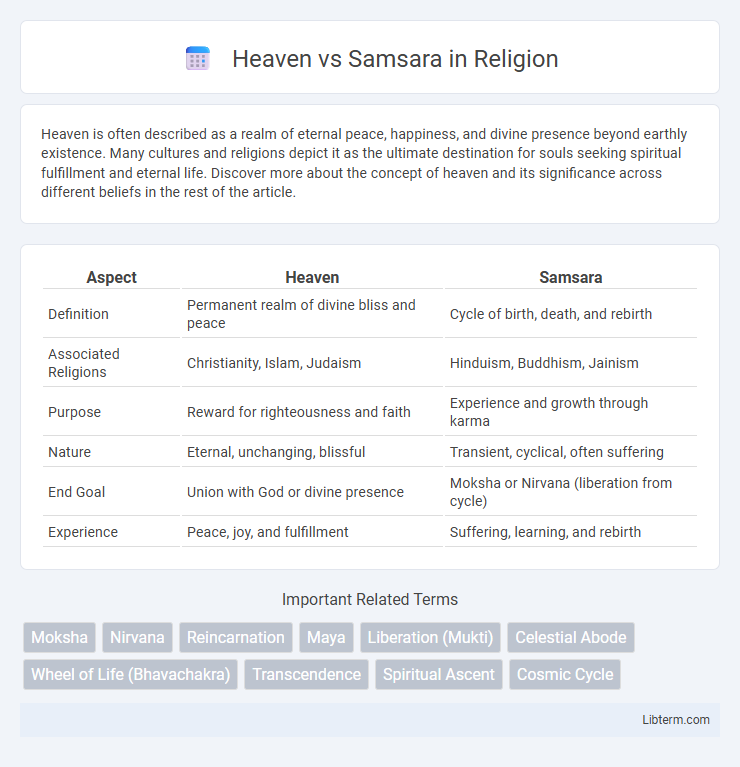Heaven is often described as a realm of eternal peace, happiness, and divine presence beyond earthly existence. Many cultures and religions depict it as the ultimate destination for souls seeking spiritual fulfillment and eternal life. Discover more about the concept of heaven and its significance across different beliefs in the rest of the article.
Table of Comparison
| Aspect | Heaven | Samsara |
|---|---|---|
| Definition | Permanent realm of divine bliss and peace | Cycle of birth, death, and rebirth |
| Associated Religions | Christianity, Islam, Judaism | Hinduism, Buddhism, Jainism |
| Purpose | Reward for righteousness and faith | Experience and growth through karma |
| Nature | Eternal, unchanging, blissful | Transient, cyclical, often suffering |
| End Goal | Union with God or divine presence | Moksha or Nirvana (liberation from cycle) |
| Experience | Peace, joy, and fulfillment | Suffering, learning, and rebirth |
Understanding the Concepts: Heaven and Samsara
Heaven represents a transcendent realm of eternal bliss and spiritual fulfillment in many religious traditions, often viewed as the ultimate reward for moral and virtuous living. Samsara refers to the continuous cycle of birth, death, and rebirth in Hinduism and Buddhism, characterized by suffering and impermanence until liberation (moksha or nirvana) is achieved. Understanding these concepts highlights contrasting views on existence, with Heaven symbolizing a final resting place and Samsara depicting ongoing worldly experience and spiritual growth.
Historical Origins of Heaven and Samsara
Heaven and Samsara originate from distinct religious and philosophical traditions, with Heaven primarily rooted in Abrahamic faiths such as Christianity, Islam, and Judaism, symbolizing an eternal realm of divine presence and reward after death. Samsara, a concept integral to Hinduism, Buddhism, and Jainism, refers to the continuous cycle of birth, death, and rebirth driven by karma, emphasizing liberation through spiritual enlightenment. The historical origins of Heaven date back to ancient Mesopotamian beliefs and evolved through Judeo-Christian theology, while Samsara developed from Vedic traditions and was elaborated in Upanishads and Buddhist scriptures.
Heaven in World Religions: Beliefs and Interpretations
Heaven, in world religions such as Christianity, Islam, and Judaism, is often depicted as a transcendent realm of eternal bliss, divine presence, and reward for righteous souls. It represents a final state of salvation and spiritual fulfillment where believers experience union with God or the divine, contrasting with the cyclical nature of Samsara in Hinduism and Buddhism. Interpretations of Heaven emphasize moral conduct, faith, and divine grace as pathways to achieve this ultimate spiritual goal.
Samsara in Eastern Philosophies: The Cycle of Rebirth
Samsara in Eastern philosophies represents the continuous cycle of birth, death, and rebirth governed by karma, perpetuating existence until enlightenment is achieved. Unlike the eternal paradise of Heaven in Western thought, Samsara embodies suffering and impermanence, emphasizing liberation (moksha or nirvana) as the ultimate spiritual goal. Key traditions like Hinduism, Buddhism, and Jainism interpret Samsara as a fundamental reality driving the soul's journey through multiple lifetimes toward transcendence.
Key Differences: Eternal Paradise vs. Endless Cycle
Heaven represents an eternal paradise where souls experience everlasting peace and joy, free from suffering and worldly desires. Samsara embodies an endless cycle of birth, death, and rebirth, driven by karma and attachment, trapping beings in continual suffering and impermanence. The fundamental difference lies in Heaven's timeless bliss contrasted with Samsara's perpetual fluctuations and spiritual bondage.
The Role of Karma in Samsara vs. Salvation in Heaven
Karma plays a crucial role in Samsara, as it determines the cycle of birth, death, and rebirth based on one's actions, influencing future existences. In contrast, salvation in Heaven is achieved through divine grace or moral purity, offering eternal liberation from worldly suffering and the cycle of rebirth. This fundamental difference underscores the importance of ethical conduct in Samsara versus faith or spiritual fulfillment in reaching Heaven.
Afterlife Expectations: Liberation vs. Reward
Heaven is commonly perceived as a reward-based afterlife where souls enjoy eternal bliss and divine presence following moral conduct. Samsara, in contrast, centers on the cycle of birth, death, and rebirth, with liberation (moksha or nirvana) as the ultimate goal, freeing individuals from suffering and reincarnation. While Heaven emphasizes eternal reward, Samsara stresses spiritual liberation as the path to transcend the afterlife cycle.
Spiritual Paths: Escaping Samsara or Reaching Heaven
Spiritual paths to escape Samsara emphasize liberation from the cycle of birth, death, and rebirth through enlightenment, self-realization, and karma purification. Reaching Heaven, commonly found in Abrahamic religions, involves attaining eternal bliss and divine presence by following moral laws, faith, and divine grace. Both paths offer frameworks for transcendence, but Samsara centers on liberation from worldly suffering, while Heaven focuses on eternal reward and communion with the divine.
Impact on Ethical and Moral Behavior
Heaven and Samsara represent contrasting frameworks influencing ethical and moral behavior in religious traditions. Belief in Heaven often encourages adherence to prescribed moral codes to attain eternal reward, fostering behaviors aligned with divine commandments. Samsara, emphasizing the cycle of rebirth and karma, promotes ethical conduct through the understanding that actions directly affect future existences, encouraging personal responsibility and moral refinement over lifetimes.
Modern Perspectives: Relevance of Heaven and Samsara Today
Modern perspectives emphasize that Heaven symbolizes ultimate spiritual fulfillment and eternal bliss, while Samsara represents the ongoing cycle of birth, death, and rebirth linked to human suffering and karma. Contemporary spiritual discourse highlights how understanding Samsara encourages mindfulness and personal growth, whereas the concept of Heaven inspires hope and moral aspiration. These ancient beliefs remain relevant by shaping ethical behavior and existential meaning in today's globalized and secular societies.
Heaven Infographic

 libterm.com
libterm.com